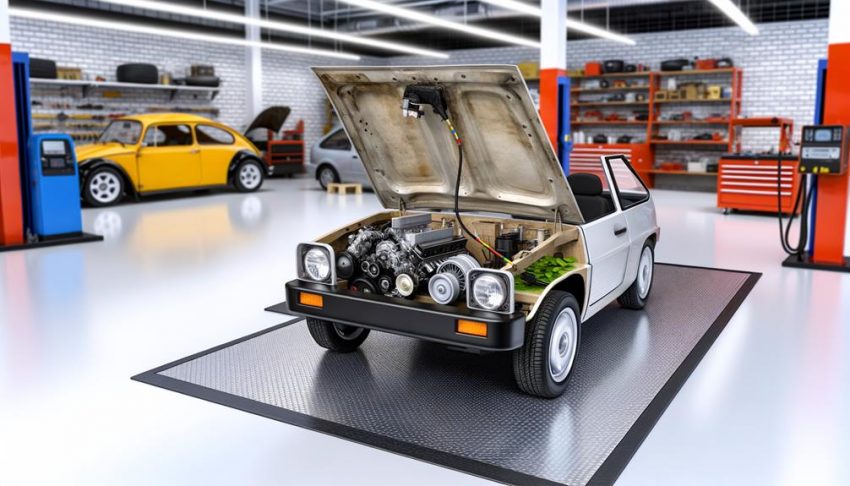So, you're wondering if it's possible to turn your gas car into an electric vehicle. The short answer is yes, but there's a lot more to it than just swapping out the engine. You'll need to evaluate the technical challenges, costs, and even regulatory standards. Converting a gas car to electric isn't just a simple DIY project; it involves a detailed process that can range from $5,000 to $20,000. But before you get overwhelmed, let's explore the conversion basics and see if this eco-friendly change could be the right fit for you.
Contents
Conversion Basics
When it comes to converting a gas car to electric, it is vital to understand the fundamentals of the process, which involves significant modifications to the vehicle's drivetrain and electrical system. Electric vehicle conversions require the removal of the internal combustion engine (ICE) and the installation of specialized components such as electric motors, battery packs, and high-voltage cables. These modifications are essential to guarantee the vehicle operates solely on electric power while maintaining safety and compliance with emissions standards.
Electric vehicle conversions often utilize conversion kits, which include all the necessary components and instructions for the transformation. A typical kit comprises an electric motor, a battery pack, a motor controller, and various high-voltage electrical components. The electric motor replaces the ICE, providing the torque and power needed for vehicle propulsion. The battery pack, usually composed of lithium-ion cells, stores the electrical energy required to power the motor. High-voltage cables and connectors guarantee efficient energy transfer between the battery pack and the motor.
Compliance with regulatory standards is a critical aspect of electric vehicle conversions. The modifications need to meet emissions and safety standards set by agencies such as the Environmental Protection Agency (EPA) and the California Air Resources Board (CARB). Certified conversion processes guarantee adherence to these regulations, safeguarding both the environment and the vehicle's occupants.
All-Electric Vehicle Conversions
When considering an all-electric vehicle conversion, you'll need to replace the internal combustion engine with an electric motor, battery pack, and high-voltage wiring. Key technical challenges include managing space and weight to maintain vehicle balance and performance, as well as ensuring compliance with safety standards. With ranges of 60 to 80 miles and costs between $5,000 and $20,000, careful planning and component selection are essential.
Conversion Process Essentials
Converting a gas car to an all-electric vehicle involves several vital steps to guarantee a successful transformation. First, you'll need to remove the internal combustion engine, transmission, gas tank, and exhaust system. This makes room for the electric motor, controller, and battery system. The conversion process is intricate and demands mechanical expertise, particularly in electric conversions.
Next, you'll install the battery pack and high-voltage cables. This step requires careful consideration of space and weight to maintain the vehicle's balance and performance. The battery system's placement is essential, as improper alignment can affect handling and efficiency.
Conversion Essentials Table
| Component Removal | Component Installation |
|---|---|
| Internal Combustion Engine | Electric Motor |
| Transmission | Controller |
| Gas Tank | Battery System and High-Voltage Cables |
Compliance with emissions and crashworthiness standards is another important aspect. Luckily, if your conversion eliminates all combustion emissions, you won't need EPA or CARB certification. However, the complexity of the conversion process can vary greatly based on your vehicle model and desired performance.
Typical ranges for converted electric vehicles are between 60 to 80 miles, with top speeds reaching 50 to 90 mph. Charging times usually vary from 6 to 12 hours, depending on the battery system used. As a result, meticulous planning and mechanical expertise are indispensable for a successful car to electric conversion.
Key Technical Challenges
Steering through the technical challenges of converting a gas car to an all-electric vehicle necessitates a deep understanding of both mechanical and electrical systems. You'll face significant compatibility issues between existing vehicle components and new electric systems. Making sure that the battery pack is properly sized and placed is essential; improper weight distribution can negatively impact handling and performance. Generally, lighter vehicles are better candidates for conversion due to these concerns.
The cooling requirements for the electric motor and battery systems must be meticulously managed. Failing to address this can lead to overheating, compromising the vehicle's performance and longevity. Extensive rewiring is another major hurdle. Integrating electric components demands a solid grasp of electrical systems and their safety protocols, making this stage both complex and vital.
You'll also need to navigate local emissions regulations, which can complicate the process further. Compliance may require thorough research and possibly certification from relevant authorities. Each of these technical challenges demands precise execution and a deep technical knowledge base to guarantee a successful conversion from gas to electric.
Plug-In Hybrid Conversions

Upgrading a hybrid electric vehicle (HEV) to a plug-in hybrid electric vehicle (PHEV) involves a technical process of adding larger battery capacity and installing charging equipment, enabling electric-only driving for longer distances. PHEV conversions markedly enhance fuel efficiency and reduce emissions, making them an attractive option for those aiming to lessen their environmental footprint. By increasing the battery capacity, a PHEV can achieve efficiency ratings of up to 100 miles per gallon equivalent (MPGe) before the auxiliary battery is depleted, a notable improvement over standard HEVs.
When considering a PHEV conversion, it's vital to comply with regulatory standards set by the Environmental Protection Agency (EPA) and the California Air Resources Board (CARB). These certifications guarantee that the modifications meet stringent emissions and performance criteria, maintaining the vehicle's environmental benefits. Non-compliance can result in penalties and potentially negate the fuel efficiency gains.
Moreover, the conversion process involves integrating sophisticated charging systems that allow the vehicle to recharge its battery from an external power source, such as a home charging station. This capability extends the electric-only driving range, further reducing reliance on fossil fuels and cutting down on greenhouse gas emissions.
However, there are potential downsides. A PHEV conversion can affect the factory warranty of the vehicle. It's important to thoroughly assess the implications on warranty coverage before proceeding. Despite these considerations, the benefits of PHEV conversions—markedly improved fuel efficiency and reduced emissions—make them a compelling choice for those committed to sustainable transportation solutions and the advancement of electric vehicles.
Hybrid Electric Conversions
When you're upgrading a Hybrid Electric Vehicle (HEV) to a Plug-In Hybrid Electric Vehicle (PHEV), adding battery capacity and charging equipment is essential to enhance fuel efficiency and cut emissions. However, these modifications must meet EPA or CARB certification requirements to comply with emissions standards. Remember, the added components need to fit within the vehicle's payload capacity without compromising its functionality.
Adding Battery Capacity
To enhance the electric-only capabilities of hybrid electric vehicles (HEVs), adding battery capacity is a vital step. By upgrading gas-powered cars to plug-in hybrid electric vehicles (PHEVs), you gain extended electric range and improved fuel efficiency. Conversion companies can retrofit your vehicle with additional battery capacity, enabling electric conversions that can achieve up to 100 MPGe until the auxiliary battery depletes.
When considering a conversion, compliance with regulatory standards, like those from the EPA or CARB, is essential. These certifications guarantee that your vehicle meets emissions and safety requirements. Properly designed conversions maintain the integrity of the vehicle's payload capacity, fundamental for supporting the added weight of the batteries and electric motors. Here's a breakdown of key considerations:
| Factor | Importance |
|---|---|
| Battery Capacity | Increased electric-only range |
| Fuel Efficiency | Up to 100 MPGe |
| Payload Capacity | Supports added weight of batteries and motors |
| Certification | Guarantees compliance with EPA/CARB standards |
| Conversion Cost | Ranges from $5,000 to $20,000 |
Certification Requirements
Guaranteeing your hybrid electric conversion meets regulatory standards is essential. For HEV conversions, certification by the Environmental Protection Agency (EPA) or the California Air Resources Board (CARB) is mandatory to guarantee compliance with emissions standards. Without proper certification, your vehicle conversion faces legal challenges and registration issues, rendering it unusable on public roads.
The certification process involves rigorous testing to verify that your conversion adheres to safety, environmental, and performance regulations. This can impact both the cost and timeline of your project, as additional modifications or extensive documentation may be required to meet EPA or CARB standards. Converters must meticulously guarantee that components like electric motors and batteries comply with these agencies' stringent guidelines for emissions standards and overall vehicle performance.
Failure to obtain the necessary certification can lead to significant legal repercussions. Furthermore, it restricts the converted vehicle's ability to be legally registered, thereby limiting its usability. As a result, prioritizing certification for your HEV conversion is vital for both regulatory compliance and the successful operation of your hybrid electric vehicle. By adhering to these standards, you guarantee a seamless changeover from gas to electric.
EV Conversion Process

Starting on the EV conversion process, you'll find it involves the meticulous removal of the internal combustion engine, transmission, gas tank, and exhaust system. To transform your gas-powered vehicle into an electric marvel, you'll replace these with an electric motor, controller, and a suitably sized battery pack. Each step demands significant mechanical and electrical expertise, often requiring professional services or specialized conversion kits.
First, you need to assess the compatibility of your existing vehicle with the EV components. Not all gas-powered vehicles are ideal candidates for conversion, so detailed research is essential. Once you've confirmed compatibility, selecting the right electric components is the next step. This includes choosing an appropriate electric motor and battery pack that match your performance expectations and vehicle specifications.
Key steps to reflect on:
- Rewiring: Extensive rewiring is mandatory to integrate the new electric system. This includes connecting the electric motor, battery pack, and controller to work seamlessly together.
- System Integration: Integrating advanced systems like regenerative braking can enhance efficiency and performance.
- Testing and Calibration: Post-installation, rigorous testing and calibration guarantee that the EV performs at its best. This step is critical for safety, performance, and compliance with local regulations.
The complexity of the EV conversion can vary. Challenges such as battery sizing, placement, and guaranteeing adherence to local regulations can make the process intricate. Additionally, this shift can take several months, particularly if you opt for a high level of customization. Conversion kits tailored to specific vehicular models can simplify this process, providing a structured pathway to achieving a fully functional electric vehicle.
Costs and Financial Considerations
When considering the costs and financial implications of converting a gas car to an electric vehicle (EV), it is essential to account for both initial and long-term expenses. Conversion costs typically start around $6,000 for essential parts, with battery installation adding another $1,000 to $3,000. This brings the average total conversion expenses to between $5,000 and $20,000, depending on the vehicle and components. High-end retrofits, particularly for more complex conversions, can exceed $20,000, greatly increasing the financial investment required.
However, it's important to recognize the potential long-term savings that can offset these upfront costs. Converted EVs operate at just a few cents per mile, a stark contrast to the $150 to $200 monthly fuel expenses for traditional gas vehicles. Over time, these reduced operational costs can help you save money, making the initial outlay more palatable.
Additionally, there are financing options and grants available that can help manage the upfront costs associated with conversions. These financial aids can make the process more accessible, lessening the immediate financial burden.
Insurance considerations also play a role in the overall financial picture. While the insurance costs for converted vehicles may vary, the long-term return on investment through lower operational expenses post-conversion is notable.
Suitable Vehicles for Conversion

While financial considerations are a key part of an EV conversion, choosing the right vehicle is equally important to the project's success. Light vehicles weighing between 2,000 to 3,000 pounds, such as the Volkswagen Rabbit, Honda Civic, and Nissan Sentra, are ideal candidates for an electric conversion. Their manageable weight and sufficient space for battery installation make the process more straightforward.
When selecting a car for conversion, vehicles with manual transmissions are often preferred. Manual transmissions can better handle the torque characteristics of electric motors, providing a smoother and more responsive driving experience. Additionally, opting for an older car with a sound body and interior, even if the engine is non-functional, is a strategic move. This focus guarantees that you're investing in a solid foundation for your EV conversion project.
Here's a quick checklist to help identify suitable vehicles for EV conversions:
- Weight Range: Light vehicles (2,000 to 3,000 pounds) for ideal battery efficiency.
- Transmission Type: Manual transmissions for better torque management.
- Condition: Older cars with good body and interior, regardless of engine condition.
Heavier vehicles, while possible to convert to electric, may experience limitations in electric range. The increased weight impacts battery efficiency and overall performance, making them less ideal candidates. By selecting the right car, you not only enhance the feasibility of your EV conversion but also contribute to sustainability goals by extending the life of older models.
Choosing the right vehicle is a critical step that can greatly influence the success and efficiency of your conversion, turning a traditional gas car into a modern electric car.
Frequently Asked Questions
How Much Does It Cost to Convert a Gas Car to Electric?
The cost to convert a gas car to electric ranges from $5,000 to $20,000. Conversion kits, battery types, and range considerations affect the price. Installation challenges, cost comparison, and environmental impact also play significant roles in determining total expenses.
Is It Legal to Convert a Gas Car to Electric?
Yes, it's legal, but you've got to check conversion regulations. Consider the environmental impact, battery options, DIY projects, insurance implications, and performance considerations. Compliance with local laws guarantees your electric conversion meets safety and emissions standards.
Is It Easy to Convert a Gas Car to Electric?
Converting a gas car to electric isn't easy. The conversion process demands mechanical and electrical expertise, sourcing required components, and understanding DIY kits. Performance comparison shows enhanced torque, but environmental impact and maintenance considerations must be evaluated carefully.
Is It Worth Converting a Car to Electric?
Absolutely, it's worth considering car conversion due to conversion benefits like lower environmental impact, performance enhancement, and advanced battery technology. You'll also appreciate increased resale value and the rewarding challenge of DIY projects.
Conclusion
Converting a gas car to electric involves replacing the internal combustion engine with electric motors, battery packs, and controllers, posing technical challenges like system compatibility and regulatory compliance. Costs range between $5,000 and $20,000, yet the investment can yield reduced operational expenses. Suitable vehicles vary, but the benefits include lower emissions and sustainable driving. By understanding the conversion process and financial implications, you can make an informed decision about shifting to an EV.
